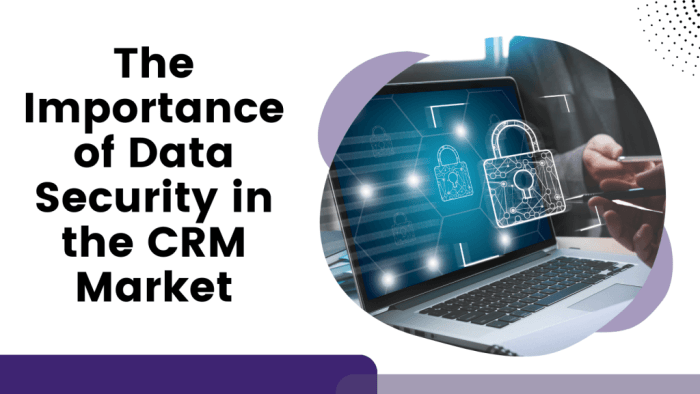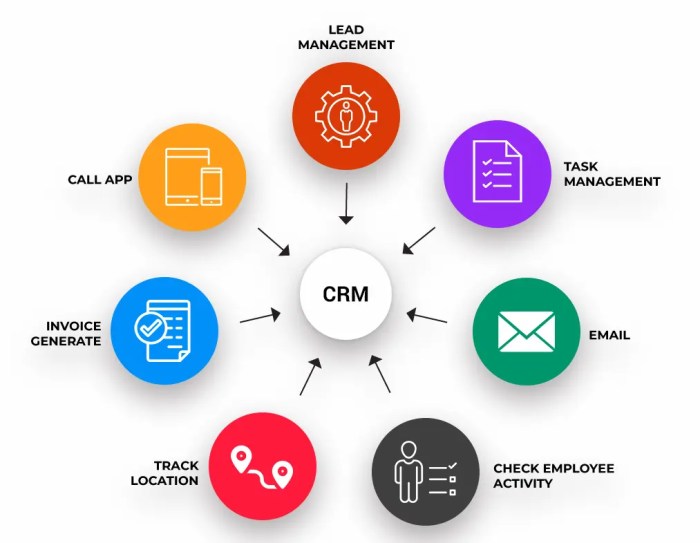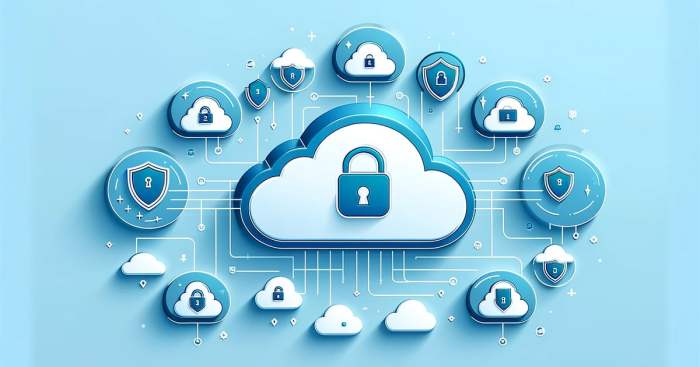CRM data security measures are crucial in today’s digital landscape to protect sensitive customer data from cyber threats and breaches. From the importance of robust security measures to best practices and compliance with data protection regulations, this topic delves into the essentials of securing CRM systems effectively.
As businesses increasingly rely on CRM systems to manage customer relationships and data, implementing proper security measures is paramount to ensure confidentiality and integrity.
Importance of CRM Data Security Measures

In today’s digital age, the protection of customer data is paramount for businesses. Implementing robust security measures in Customer Relationship Management (CRM) systems is crucial to safeguard sensitive information and maintain trust with clients.
Obtain a comprehensive document about the application of RMM compliance requirements and regulations that is effective.
Risks of Poor CRM Data Security
- Unauthorized Access: Without proper security measures, unauthorized individuals may gain access to sensitive customer data, leading to breaches and potential misuse.
- Data Theft: Poor CRM data security can result in data theft, where valuable customer information such as contact details, payment information, and purchasing history is stolen.
- Reputational Damage: A data breach in a CRM system can severely damage a company’s reputation, leading to loss of customer trust and credibility.
Examples of Data Breaches in CRM Systems, CRM data security measures
- In 2018, the Marriott International data breach exposed the personal information of over 500 million customers, including names, addresses, and payment details. This breach highlighted the importance of robust security measures in CRM systems to prevent such large-scale incidents.
- The 2017 Equifax data breach compromised the personal information of 147 million individuals, emphasizing the need for stringent security protocols to protect customer data in CRM databases.
- In 2019, Capital One experienced a data breach that exposed the personal information of over 100 million customers, underscoring the risks associated with inadequate CRM data security measures.
Best Practices for Ensuring CRM Data Security: CRM Data Security Measures

When it comes to safeguarding CRM data, implementing the best security practices is essential to protect sensitive information and maintain the trust of customers. By incorporating various layers of security, utilizing encryption methods, and managing access controls effectively, businesses can enhance their CRM data security measures.
Different Layers of Security
Implementing multiple layers of security is crucial in ensuring comprehensive protection for CRM data. Some key layers include:
- Firewalls: Deploying firewalls helps in preventing unauthorized access to CRM databases by filtering incoming and outgoing network traffic.
- Multi-factor Authentication: Requiring multiple forms of verification, such as passwords and biometric data, adds an extra layer of security against unauthorized access.
- Regular Software Updates: Keeping CRM software up to date with the latest security patches helps in addressing vulnerabilities and minimizing the risk of cyber attacks.
Encryption Methods for CRM Databases
Choosing the right encryption method is essential for protecting sensitive information stored in CRM databases. Some encryption methods suitable for CRM data security include:
- End-to-End Encryption: This method ensures that data is encrypted from the point of entry to the point of storage, providing continuous protection against unauthorized access.
- Tokenization: By replacing sensitive data with unique tokens, tokenization helps in securing CRM data and reducing the risk of exposure in case of a breach.
- Data Masking: Data masking involves replacing real data with fictional data in non-production environments to protect sensitive information during development and testing.
Monitoring and Managing Access Controls
Effective monitoring and management of access controls are essential for maintaining the security of CRM systems. Strategies for ensuring secure access include:
- Role-Based Access Control: Assigning specific roles and permissions to users based on their responsibilities helps in controlling access to sensitive CRM data.
- Audit Trails: Keeping track of user activities through audit trails enables businesses to monitor access, detect unauthorized actions, and investigate security incidents.
- Regular Reviews: Conducting periodic reviews of access controls and permissions ensures that only authorized users have the necessary privileges to access CRM data.
Compliance with Data Protection Regulations in CRM

In today’s digital age, data protection regulations play a crucial role in shaping CRM data security measures. With the implementation of laws such as GDPR (General Data Protection Regulation) and CCPA (California Consumer Privacy Act), companies are required to adhere to strict guidelines to safeguard customer data and ensure privacy.
Role of GDPR and CCPA in CRM Data Security
- GDPR: GDPR is a comprehensive data protection regulation that applies to companies operating within the EU or handling personal data of EU residents. It emphasizes the importance of obtaining explicit consent from individuals for data processing, implementing data protection measures, and notifying authorities of data breaches.
- CCPA: CCPA is a state-level regulation in California that gives consumers more control over the personal information that businesses collect about them. It requires businesses to disclose the types of data collected and shared, as well as allowing consumers to opt-out of the sale of their data.
Implications of Non-Compliance with Data Protection Regulations
- Financial Penalties: Non-compliance with data protection regulations can result in hefty fines levied by regulatory authorities. For example, under GDPR, fines can amount to up to €20 million or 4% of the company’s global annual turnover, whichever is higher.
- Reputational Damage: Failing to comply with data protection laws can lead to a loss of trust and credibility among customers, damaging the company’s reputation in the market.
Aligning CRM Data Security Practices with Regulatory Requirements
- Data Minimization: Companies can align their CRM data security practices with regulatory requirements by implementing data minimization techniques. This involves collecting only the necessary data required for legitimate business purposes.
- Security Measures: Implementing robust security measures such as encryption, access controls, and regular security audits can help ensure compliance with data protection regulations.
- Consent Management: Obtaining explicit consent from customers before processing their data and providing them with options to manage their preferences can help companies align with regulatory requirements.